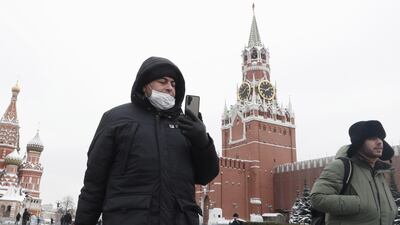US President Joe Biden, it seems, has been forced to address the limitations in his “maximum diplomacy” approach to foreign affairs, which he sought to pursue as an alternative to his predecessor Donald Trump’s “maximum pressure” policy. Mr Biden has in recent weeks wielded the sword of sanctions and military response to dissuade Russia from sending its troops into neighbouring Ukraine – at least thus far.
The Russian leadership seems divided on the Ukraine crisis. There are those who want Moscow to accept western overtures as a path to de-escalation and, thereby, avoid sanctions. Others warn against falling for what they view to be diplomatic stalling from the US and European powers, and seize the opportunity to stop Nato’s eastward expansion for the foreseeable future.
Russia’s allies are also closely watching.
China reportedly doesn’t want any escalation to affect the Beijing Winter Olympics, which gets under way on Friday. Iran, while feeling emboldened by the strategic pact it recently signed with Russia, feels anxious about the indirect impact sanctions against its ally might have on Tehran’s expansionist projects in the Middle East.
The regime is also worried that the possible collapse of its nuclear talks with the permanent members of the UN Security Council, plus Germany, would scuttle its hopes of getting crippling sanctions lifted. Additionally, Iran is concerned that it may have slid down the list of western priorities as an outcome of the Ukraine crisis. Meanwhile, it has to contend with the political and diplomatic support being mobilised around the UAE after the recent attacks on Abu Dhabi carried out by Yemen’s Houthi rebels, to whom Iran provides all kinds of support.
Tehran has watched with concern as the ice has begun to thaw between the Gulf countries and Turkey in recent months. It is also unhappy about the possibility of improving Gulf-Lebanon relations after the visit of Kuwait’s foreign minister, Sheikh Ahmad Nasser Al Mohammad Al Sabah, to Beirut earlier in the month. The trip follows a diplomatic rift that emerged between Lebanon and the GCC last year, after a senior Lebanese minister made controversial comments relating to the conflict in Yemen.
Lebanon’s Arab partners have proposed a set of prescriptions to rebuild the country. But with a corrupt governing class in charge in Beirut, the likelihood of any of these proposals being approved and implemented is next to none, at least for now. Moreover, Hezbollah remains a factor in the country’s politics. The Iranian-backed proxy answers only to Tehran, specifically the Islamic Revolutionary Guard Corps, which seeks to export Iran’s theocratic model of government to the Arab world, from Yemen to Lebanon via Iraq and Syria, through the destruction of their national sovereignty.

Russia understands Iran’s need to spread its influence in the Middle East, and it is a model that may even suit Moscow’s interests. But the Biden administration, which has so far paid little more than lip service to its Arab allies on this issue, may be having a policy rethink following the Abu Dhabi attacks.
But with its focus squarely on Ukraine, the Iran nuclear issue has, to Tehran’s chagrin, been moved to the backburner. The Iranian regime is worried that, with the US midterm elections scheduled to be held later this year, Washington may kick this can further down the road.
The sanctions, a key instrument in Mr Trump’s maximum pressure policy, have now become a key instrument for the Biden administration. This is why it is using it as a threat to Russia.
Moscow understands the devastating impact western sanctions could have on Russia’s economy and society. Cutting the country off from the “Swift” system – which serves as an intermediary and executor of financial transactions between banks worldwide – will mean it won’t be able to receive transactions from outside to pay for its exports, or to transfer funds to pay for its imports. The inability to use credit cards will make it very difficult for Russians to travel. Try explaining that to the approximately five million Russians who travel annually to Turkey.
Moscow finds itself with two options.
One is to quietly roll back its military measures and pivot to diplomatic talks led by Sergey Lavrov. The Russian foreign minister is adept at turning failure into a success. He has stated that the escalation of tensions in Europe’s east and the subsequent diplomatic attempts pursued by the West are exactly what Russia sought from the get-go. A strong claim to have forced negotiations with Nato could provide a face-saving way out of a confrontation.
The other view, led by the brass, is that military action may be necessary to avoid Ukraine being absorbed into Nato. They argue that the West has categorically rejected Moscow’s demands and ignored its proposals, which leaves the latter with few options.
The military, it seems, seeks to escalate matters in Donbass – the region in south-eastern Ukraine that’s been occupied by pro-Russian groups since 2014 – which could lead to a broader conflict.
It won’t be an easy decision for Moscow to make. But while its weighs its options, it will do well to remind itself that when Estonia, Latvia and Lithuania – all former Soviet republics, like Ukraine – joined Nato, this had little bearing on Russian security. Will Ukraine’s addition to the western security alliance – highly unlikely though it is at this stage – really change its fortunes?











